By: debbie lynn elias
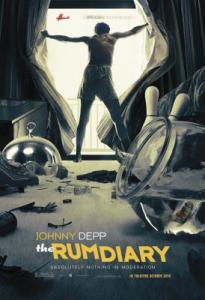
I have great respect and admiration for Johnny Depp, as both an actor and risk taker. I have long had great respect and been a huge fan of Hunter S. Thompson, as both a novelist, and columnist dating back to his early days writing for “Rolling Stone” in the 70’s. I am obsessive about “Fear and Loathing in Las Vegas”, the first Depp incarnation as Thompson in one of Thompson’s best works. And because of this, I have been impatiently awaiting THE RUM DIARY, another adventure of Hunter S. Thompson with Johnny Depp incarnation.
Given the “balls out, nothing in moderation” style of Thompson with every aspect of life, literature and journalism, and after Depp’s uncanny and indelible portrayal of him in “Fear and Loathing”, THE RUM DIARY pales in comparison; a very tepid and much tamer version of “Fear and Loathing” to say the least. Based on Thompson’s novel of the same name, his first, which until Depp found it buried in Thompson’s home, had never been published, THE RUM DIARY is a fictionalized version of an early Thompson in his pre-Gonzo days.
Frustrated as a writer and unable to find his own voice and make it heard, Paul Kemp forces himself to leave New York and head to tropical, sunny Puerto Rico, certain that he can make a name for himself in this island paradise. The time is 1960. The tale end of the Eisenhower era and pre-Kennedy Camelot, Puerto Rico was ripe for capitalist Americans intent on making Puerto Rico the resort for the wealthy. Unscrupulous in their methods, developers celebrated corruption and power as they illegally snatched up beachfront properties from the locals, creating a playground for the rich and shanty towns for the poor.
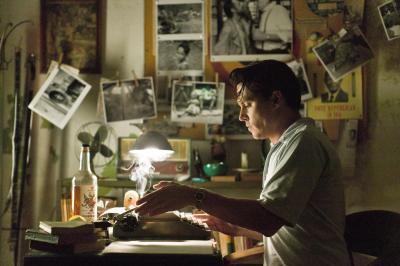
Nabbing a job at the local San Juan Star, Kemp jumps in head first, anxious to write about exploitation, corruption and other hard hitting news, not the Horoscope section which he is assigned to handle by editor Lotterman. Easily falling into the island lifestyle of eat, drink and be merry, and then drink some more, it doesn’t take long for Kemp to absorb not only all the rum in sight, but some local color along the way.
Paired with photographer Bob Sala, the two end up sharing a less than functional apartment. But hey, who needs water when rum is free-flowing! Rounding out the little trio of alcoholics is Moburg, a reporter so perpetually soused and strung out on hallucinogenics it’s a wonder he can even stand up let alone have an occasional flash of brilliance. With Sala and Moburg showing Kemp the ropes of surviving the clash of the jungles, Kemp seems to be doing alright; that is until he meets Sanderson. An affluent and influence American businessman, Sanderson has plans to develop a nearby pristine unblemished island currently being used by the US military. Making Sanderson’s plan so perfect and infallible are his ties to former military personnel and politicians with inside information. From the get-go Kemp smells a rat.
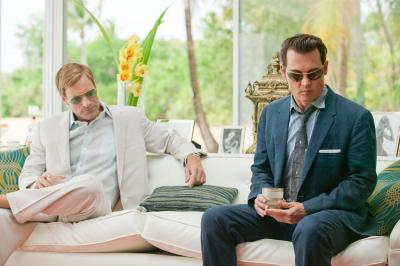
Why Sanderson’s interest in Kemp? Easy. Kemp is young and hungry. And Sanderson is willing to pay Kemp well if he will come on board and write glowing stories about the pending island development; of course, omitting all the illegal activities that are occurring to bring the project to fruition. Taken under Sanderson’s wing and given a car and cash, Kemp is tempted by the offer, but even more tempted by Sanderson’s girlfriend Chenault.
But fear not. For even through a rum soaked haze, Kemp has a crisis of conscience. And as Lotterman bails on the newspaper and investors shut it down, Kemp does the unthinkable and we see the birth of gonzo.

At this stage of the game, I can envision no one but Johnny Depp ever portraying Hunter S. Thompson, be it fact or fiction. He is the embodiment of Thompson not only in speech and mannerisms but in his very essence. Known for his great friendship with Thompson (Depp even paid for his funeral which included launching Thompson’s ashes from a rocket), Depp won us over in “Fear and Loathing”, so it comes as no surprise that he easily falls back into a Hunter S. Thompson persona and character with the cadence and tonal inflection of voice and manner. Although a tamer character, it is a familiar one, lending a comfortable ease to the film that is juxtapositioned against the tension and intrigue of the unfolding corruptive drama. Particularly appealing is the emotional depth that Depp brings to Kemp in the last third of the film, setting the stage for who Kemp (and Thompson himself) would ultimately become. An added bonus – who plays a functioning drunk better than Depp? Be it as pirate or gonzo literati, he’s your man.
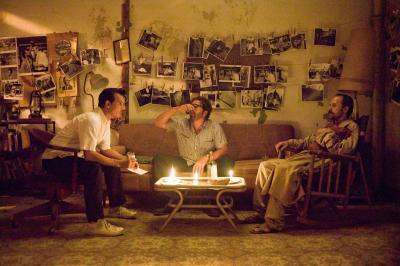
Michael Rispoli has long been cast as the goofy best friend, someone who will never hit the big time, someone who had dreams but settled for mediocrity and goes about life shuffling along, never really knowing what he wants, stuck where he is. With this resume, Rispoli is the only person to play long suffering Bob Sala. A perfect balance to the Depp’s Kemp, this is one of the finest performances of Rispoli’s career. He makes you feel Sala’s unspoken suffering and disappointment with life. You empathize and sympathize with him.
Adding great comic, and tortured relief is Giovanni Ribisi’s Moburg. A quirky oddity, he plays Moburg to the hilt in a drugged-out hallucinogenic euphoria, dressing up in Nazi uniforms and listening to records of Hitler’s speeches. Weird, odd, disturbing, but a comfortable fit in the overall portrait being painted. Aaron Eckhart brings the nouveau riche greedy American persona of Sanderson to fruition with frenetic energy and an always unsettling smile. A great contrast to the calm of Kemp and the island as a whole.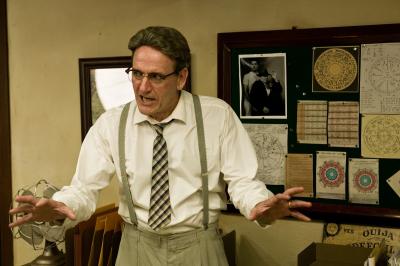
A real standout is Richard Jenkins as editor Lotterman. Frenzied, hysterical like a fretting little old lady, but with flashes of professionalism, Jenkins captures the frustrated, washed up newspaper man to a tee. Once a true journalist but never attaining any success more than a reporter, Jenkins infuses Lotterman with emotional subtext that gives the sense of a man with grandiose dreams of being a publisher, but in order to do so, falls prey to the very corruption he probably once fought so hard to expose. Watching Depp and Jenkins toe-to-toe is like watching chess masters.
Sadly, Amber Heard seems wasted as Chenault. Unimpressive character with little relevance to the story but for completing the picture of “a picture postcard life” for men like Sanderson. While Chenault does serve as the catalyst that puts Kemp in bed with Sanderson, there were other opportunities in the story where this could have been achieved.

Written and directed by Bruce Robinson, he must be complimented for his adaptation of the novel. Not only shifting the focus of the film to one of championing the local people and criticizing the capitalist corruption, Robinson took the two lead characters in the novel, Yeoman and Kemp, seamlessly melding them into one. On reading the book, it is easy to see that Yeoman and Kemp are actually just two sides of Thompson, thus suspending any disbelief in the film on seeing only Kemp. Admitting that there are only three lines that Hunter wrote in the whole script”, Robinson does a superb job of capturing Thompson’s vernacular, something that is particularly noticeable with Depp’s dialogue delivery. The entire tone of the film, however, belies its not being written by Thompson. Robinson is that spot on with his comprehension and absorption of Thompson. And as if the free-flowing organically dry humor isn’t already enough, Robinson tosses in some comic moments thanks to the cock-fighting El Monstro.
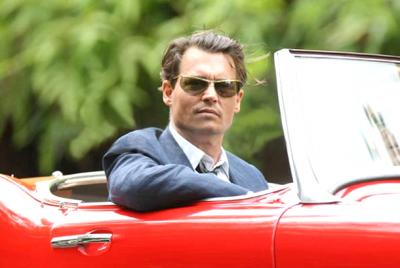
Chris Seagers’ production design is exemplary; so much so that one can almost smell the rum-soaked sweat, stale cigarettes and wet newsprint, poorly masked by the salty sea air, wafting from the screen. on the salty sea air. Visually compelling with contrast and punctuated use of color and texture in the design and visual sensibility, from Sanderson’s house to the grit, grime and peeling paint of the Kemp-Sala flat, the palette exemplifies 1960 Puerto Rico.
Showcasing Seagers’ work is that of cinematographer Dariusz Wolski. With a thoughtful and reflective balance of light and shadow, Wolski celebrates the revolving worlds of Puerto Rico and thematic elements of the story. From the gritty umbers of kemp’s apartment to the dirty pallor of grey and beige permeating the newspaper office to the brilliant, clean, pristine light of Sanderson’s wealth and power, all are integral to the look and texture of THE RUM DIARY and the consciential crisis of Kemp. Equally impressive is lensing which deliberately and carefully blends intimacy with expansive panoramic vistas.
But at the end of the day, when we look behind the surface of the film, behind the story, behind the alcohol, we see an intimate portrait of a man obsessed about his craft – journalism, writing; a man who found his voice in the haze of a hangover; a man who went on to become “gonzo.”
Kemp – Johnny Depp
Sanderson – Aaron Eckhart
Sala – Michael Rispoli
Lotterman – Richard Jenkins
Moburg – Giovanni Ribisi
Chenault – Amber Heard
Written and Directed by Bruce Robinson, based on the novel by Hunter S. Thompson.












